Pavan Kapanipathi
MiGrATe: Mixed-Policy GRPO for Adaptation at Test-Time
Aug 12, 2025Abstract:Large language models (LLMs) are increasingly being applied to black-box optimization tasks, from program synthesis to molecule design. Prior work typically leverages in-context learning to iteratively guide the model towards better solutions. Such methods, however, often struggle to balance exploration of new solution spaces with exploitation of high-reward ones. Recently, test-time training (TTT) with synthetic data has shown promise in improving solution quality. However, the need for hand-crafted training data tailored to each task limits feasibility and scalability across domains. To address this problem, we introduce MiGrATe-a method for online TTT that uses GRPO as a search algorithm to adapt LLMs at inference without requiring external training data. MiGrATe operates via a mixed-policy group construction procedure that combines on-policy sampling with two off-policy data selection techniques: greedy sampling, which selects top-performing past completions, and neighborhood sampling (NS), which generates completions structurally similar to high-reward ones. Together, these components bias the policy gradient towards exploitation of promising regions in solution space, while preserving exploration through on-policy sampling. We evaluate MiGrATe on three challenging domains-word search, molecule optimization, and hypothesis+program induction on the Abstraction and Reasoning Corpus (ARC)-and find that it consistently outperforms both inference-only and TTT baselines, demonstrating the potential of online TTT as a solution for complex search tasks without external supervision.
Putting It All into Context: Simplifying Agents with LCLMs
May 12, 2025Abstract:Recent advances in language model (LM) agents have demonstrated significant potential for automating complex real-world tasks. To make progress on these difficult tasks, LM agent architectures have become increasingly complex, often incorporating multi-step retrieval tools, multiple agents, and scaffolding adapted to the underlying LM. In this work, we investigate whether all of this complexity is necessary, or if parts of these scaffolds can be removed on challenging tasks like SWE-bench. We show that in the case of SWE-bench, simply putting the entire environment into the context of a long context language model (LCLM) and properly prompting the model makes it competitive with carefully tuned, complex agent scaffolds. We show that a Gemini-1.5-Pro model without any scaffolding or tools achieves 38% on SWE-Bench-Verified, comparable with approaches using carefully tuned agent scaffolds (32%). While the unscaffolded approach with Gemini-1.5-Pro falls short of the strongest agentic architectures, we demonstrate that the more capable Gemini-2.5-Pro using the same unscaffolded approach directly attains a 50.8% solve rate. Additionally, a two-stage approach combining Gemini-1.5-Pro with Claude-3.7 achieves a competitive 48.6% solve rate.
NESTFUL: A Benchmark for Evaluating LLMs on Nested Sequences of API Calls
Sep 04, 2024Abstract:Autonomous agent applications powered by large language models (LLMs) have recently risen to prominence as effective tools for addressing complex real-world tasks. At their core, agentic workflows rely on LLMs to plan and execute the use of tools and external Application Programming Interfaces (APIs) in sequence to arrive at the answer to a user's request. Various benchmarks and leaderboards have emerged to evaluate an LLM's capabilities for tool and API use; however, most of these evaluations only track single or multiple isolated API calling capabilities. In this paper, we present NESTFUL, a benchmark to evaluate LLMs on nested sequences of API calls, i.e., sequences where the output of one API call is passed as input to a subsequent call. NESTFUL has a total of 300 human annotated samples divided into two types - executable and non-executable. The executable samples are curated manually by crawling Rapid-APIs whereas the non-executable samples are hand picked by human annotators from data synthetically generated using an LLM. We evaluate state-of-the-art LLMs with function calling abilities on NESTFUL. Our results show that most models do not perform well on nested APIs in NESTFUL as compared to their performance on the simpler problem settings available in existing benchmarks.
Granite-Function Calling Model: Introducing Function Calling Abilities via Multi-task Learning of Granular Tasks
Jun 27, 2024


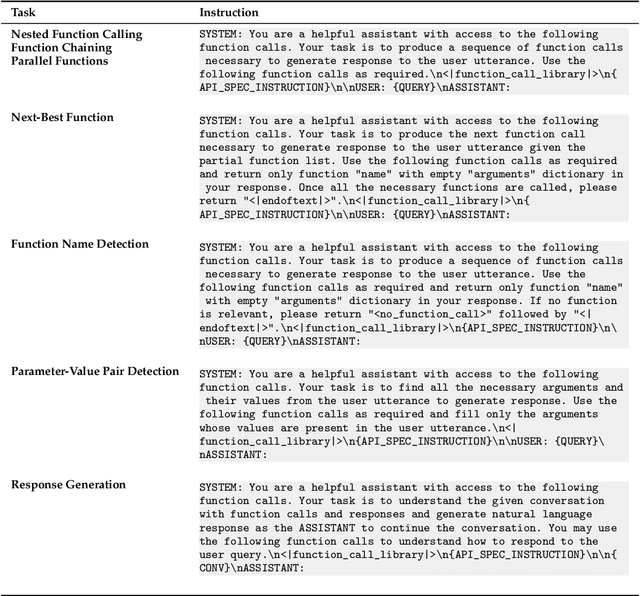
Abstract:Large language models (LLMs) have recently shown tremendous promise in serving as the backbone to agentic systems, as demonstrated by their performance in multi-faceted, challenging benchmarks like SWE-Bench and Agent-Bench. However, to realize the true potential of LLMs as autonomous agents, they must learn to identify, call, and interact with external tools and application program interfaces (APIs) to complete complex tasks. These tasks together are termed function calling. Endowing LLMs with function calling abilities leads to a myriad of advantages, such as access to current and domain-specific information in databases and knowledge sources, and the ability to outsource tasks that can be reliably performed by tools, e.g., a Python interpreter or calculator. While there has been significant progress in function calling with LLMs, there is still a dearth of open models that perform on par with proprietary LLMs like GPT, Claude, and Gemini. Therefore, in this work, we introduce the GRANITE-20B-FUNCTIONCALLING model under an Apache 2.0 license. The model is trained using a multi-task training approach on seven fundamental tasks encompassed in function calling, those being Nested Function Calling, Function Chaining, Parallel Functions, Function Name Detection, Parameter-Value Pair Detection, Next-Best Function, and Response Generation. We present a comprehensive evaluation on multiple out-of-domain datasets comparing GRANITE-20B-FUNCTIONCALLING to more than 15 other best proprietary and open models. GRANITE-20B-FUNCTIONCALLING provides the best performance among all open models on the Berkeley Function Calling Leaderboard and fourth overall. As a result of the diverse tasks and datasets used for training our model, we show that GRANITE-20B-FUNCTIONCALLING has better generalizability on multiple tasks in seven different evaluation datasets.
Granite Code Models: A Family of Open Foundation Models for Code Intelligence
May 07, 2024



Abstract:Large Language Models (LLMs) trained on code are revolutionizing the software development process. Increasingly, code LLMs are being integrated into software development environments to improve the productivity of human programmers, and LLM-based agents are beginning to show promise for handling complex tasks autonomously. Realizing the full potential of code LLMs requires a wide range of capabilities, including code generation, fixing bugs, explaining and documenting code, maintaining repositories, and more. In this work, we introduce the Granite series of decoder-only code models for code generative tasks, trained with code written in 116 programming languages. The Granite Code models family consists of models ranging in size from 3 to 34 billion parameters, suitable for applications ranging from complex application modernization tasks to on-device memory-constrained use cases. Evaluation on a comprehensive set of tasks demonstrates that Granite Code models consistently reaches state-of-the-art performance among available open-source code LLMs. The Granite Code model family was optimized for enterprise software development workflows and performs well across a range of coding tasks (e.g. code generation, fixing and explanation), making it a versatile all around code model. We release all our Granite Code models under an Apache 2.0 license for both research and commercial use.
API-BLEND: A Comprehensive Corpora for Training and Benchmarking API LLMs
Feb 23, 2024Abstract:There is a growing need for Large Language Models (LLMs) to effectively use tools and external Application Programming Interfaces (APIs) to plan and complete tasks. As such, there is tremendous interest in methods that can acquire sufficient quantities of train and test data that involve calls to tools / APIs. Two lines of research have emerged as the predominant strategies for addressing this challenge. The first has focused on synthetic data generation techniques, while the second has involved curating task-adjacent datasets which can be transformed into API / Tool-based tasks. In this paper, we focus on the task of identifying, curating, and transforming existing datasets and, in turn, introduce API-BLEND, a large corpora for training and systematic testing of tool-augmented LLMs. The datasets mimic real-world scenarios involving API-tasks such as API / tool detection, slot filling, and sequencing of the detected APIs. We demonstrate the utility of the API-BLEND dataset for both training and benchmarking purposes.
Formally Specifying the High-Level Behavior of LLM-Based Agents
Oct 12, 2023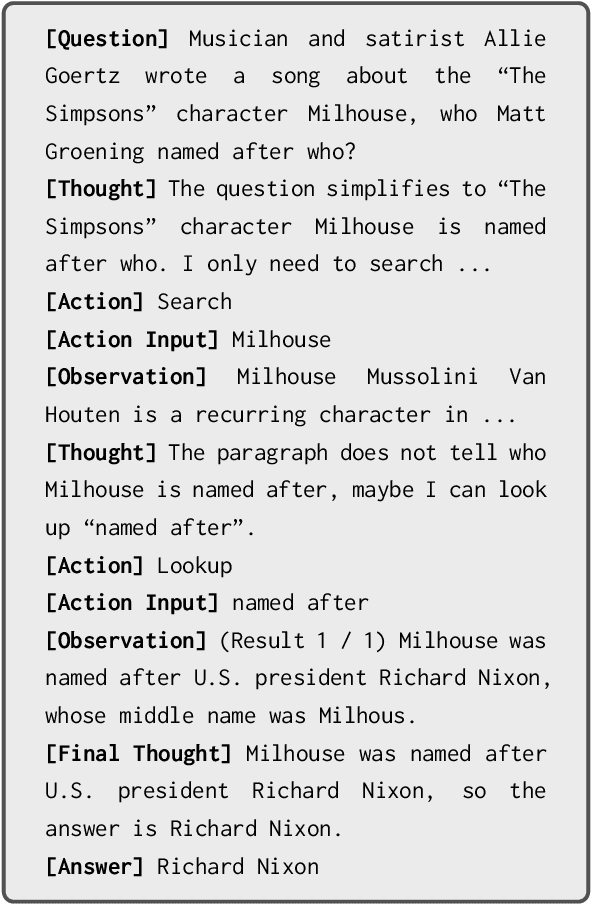
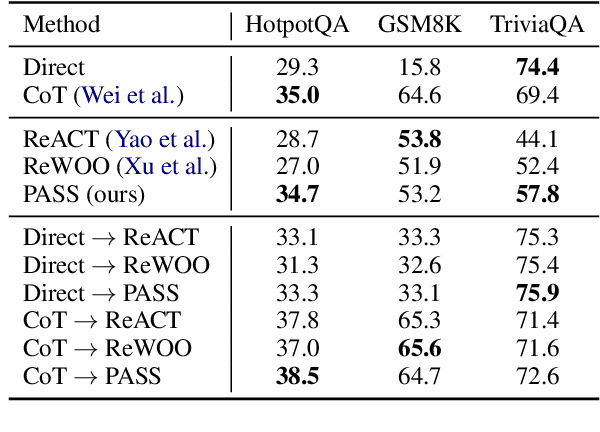
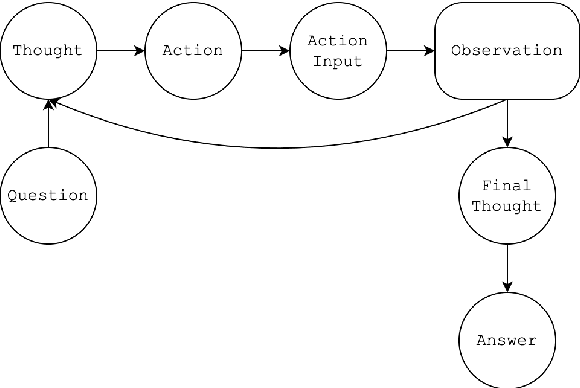

Abstract:LLM-based agents have recently emerged as promising tools for solving challenging problems without the need for task-specific finetuned models that can be expensive to procure. Currently, the design and implementation of such agents is ad hoc, as the wide variety of tasks that LLM-based agents may be applied to naturally means there can be no one-size-fits-all approach to agent design. In this work we aim to alleviate the difficulty of designing and implementing new agents by proposing a minimalistic, high-level generation framework that simplifies the process of building agents. The framework we introduce allows the user to specify desired agent behaviors in Linear Temporal Logic (LTL). The declarative LTL specification is then used to construct a constrained decoder that guarantees the LLM will produce an output exhibiting the desired behavior. By designing our framework in this way, we obtain several benefits, including the ability to enforce complex agent behavior, the ability to formally validate prompt examples, and the ability to seamlessly incorporate content-focused logical constraints into generation. In particular, our declarative approach, in which the desired behavior is simply described without concern for how it should be implemented or enforced, enables rapid design, implementation and experimentation with different LLM-based agents. We demonstrate how the proposed framework can be used to implement recent LLM-based agents, and show how the guardrails our approach provides can lead to improvements in agent performance. In addition, we release our code for general use.
Learning Symbolic Rules over Abstract Meaning Representations for Textual Reinforcement Learning
Jul 05, 2023
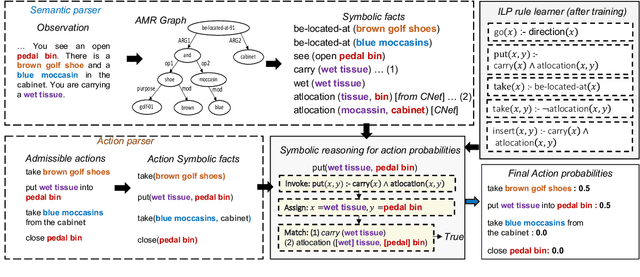

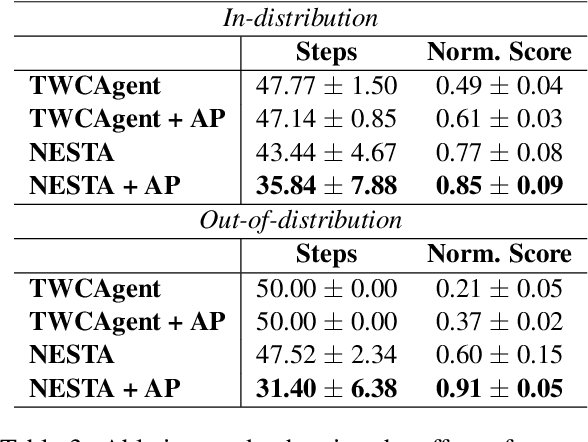
Abstract:Text-based reinforcement learning agents have predominantly been neural network-based models with embeddings-based representation, learning uninterpretable policies that often do not generalize well to unseen games. On the other hand, neuro-symbolic methods, specifically those that leverage an intermediate formal representation, are gaining significant attention in language understanding tasks. This is because of their advantages ranging from inherent interpretability, the lesser requirement of training data, and being generalizable in scenarios with unseen data. Therefore, in this paper, we propose a modular, NEuro-Symbolic Textual Agent (NESTA) that combines a generic semantic parser with a rule induction system to learn abstract interpretable rules as policies. Our experiments on established text-based game benchmarks show that the proposed NESTA method outperforms deep reinforcement learning-based techniques by achieving better generalization to unseen test games and learning from fewer training interactions.
MISMATCH: Fine-grained Evaluation of Machine-generated Text with Mismatch Error Types
Jun 18, 2023



Abstract:With the growing interest in large language models, the need for evaluating the quality of machine text compared to reference (typically human-generated) text has become focal attention. Most recent works focus either on task-specific evaluation metrics or study the properties of machine-generated text captured by the existing metrics. In this work, we propose a new evaluation scheme to model human judgments in 7 NLP tasks, based on the fine-grained mismatches between a pair of texts. Inspired by the recent efforts in several NLP tasks for fine-grained evaluation, we introduce a set of 13 mismatch error types such as spatial/geographic errors, entity errors, etc, to guide the model for better prediction of human judgments. We propose a neural framework for evaluating machine texts that uses these mismatch error types as auxiliary tasks and re-purposes the existing single-number evaluation metrics as additional scalar features, in addition to textual features extracted from the machine and reference texts. Our experiments reveal key insights about the existing metrics via the mismatch errors. We show that the mismatch errors between the sentence pairs on the held-out datasets from 7 NLP tasks align well with the human evaluation.
Scalable Learning of Latent Language Structure With Logical Offline Cycle Consistency
May 31, 2023



Abstract:We introduce Logical Offline Cycle Consistency Optimization (LOCCO), a scalable, semi-supervised method for training a neural semantic parser. Conceptually, LOCCO can be viewed as a form of self-learning where the semantic parser being trained is used to generate annotations for unlabeled text that are then used as new supervision. To increase the quality of annotations, our method utilizes a count-based prior over valid formal meaning representations and a cycle-consistency score produced by a neural text generation model as additional signals. Both the prior and semantic parser are updated in an alternate fashion from full passes over the training data, which can be seen as approximating the marginalization of latent structures through stochastic variational inference. The use of a count-based prior, frozen text generation model, and offline annotation process yields an approach with negligible complexity and latency increases as compared to conventional self-learning. As an added bonus, the annotations produced by LOCCO can be trivially repurposed to train a neural text generation model. We demonstrate the utility of LOCCO on the well-known WebNLG benchmark where we obtain an improvement of 2 points against a self-learning parser under equivalent conditions, an improvement of 1.3 points against the previous state-of-the-art parser, and competitive text generation performance in terms of BLEU score.
 Add to Chrome
Add to Chrome Add to Firefox
Add to Firefox Add to Edge
Add to Edge